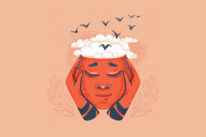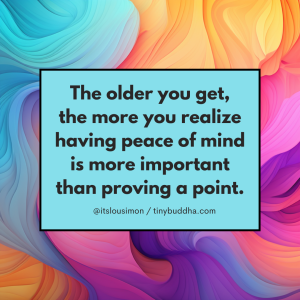
“Beneath every behavior there is a feeling. And beneath each feeling is a need. And when we meet that need, rather than focus on the behavior, we begin to deal with the cause, not the symptom.” ~Ashleigh Warner
Do you ever wonder what creates anxiety and why so many people are anxious?
Anxiety doesn’t just come from a thought we’re thinking, it comes from inside our body—from our internal patterning, where unresolved trauma, deep shame, and painful experiences are still “running.”
It often comes from false underlying beliefs that say, “Something’s wrong with me, I’m flawed, I’m bad, I’m wrong, I don’t belong.”
Anxiety can be highly misunderstood because it’s not just a symptom, it often stems from what’s going on subconsciously as a result of past experiences, mostly from when we were little beings. And yes, the body does keep score and remembers even if the mind doesn’t.
Anxiety is often a signal/experience that happens automatically from our nervous system. It’s emotions/sensations letting us know that we don’t feel safe with ourselves, life, or the person we’re with or situation we’re in. It’s our inner child saying, “Hey, I need some love and attention.”
Maybe, instead of blaming, shaming, or making ourselves feel bad or wrong for experiencing anxiety, we can be more compassionate and caring, knowing it often comes from deep unresolved pain.
Just taking a medication or doing symptom relief may help ease the anxiety, but are we really healing the “root” cause? Are we taking time to understand what the anxiety is conveying? Where it’s actually coming from and what it’s showing us about what we need?
Many people are living with anxiety but aren’t even aware it’s happening. Our minds and bodies aren’t at ease, and we may try to soothe them by being busy, over-eating, drinking alcohol, scrolling through the internet, smoking, compulsive shopping, over-achieving, or constantly working.
From my earliest memory I felt anxious. I didn’t feel safe at home or at school. I felt different than the other kids; in a sense I was an outcast.
I was alone a lot, and food became my companion and coping mechanism. When I was eating, I felt like I was being soothed. It gave me a way to focus on something else to avoid my painful feelings, and it also helped me cope with being screamed at or ignored by my family.
At age eight I started experiencing dizziness, which was another form of anxiety showing up in my body. My parents took me to the doctor, and they checked my ears and did other tests but couldn’t find anything wrong with me physically.
That’s because the dizziness wasn’t caused by something physically wrong with my body, it was stemming from the fear and anxiety I was experiencing. I was afraid of everyone and everything—I was afraid of living and being.
I was experiencing extreme panic. I didn’t know how to be, and no one comforted me when I was afraid; instead, my father called me a “big baby.”
When I was ten my parents started leaving me at home alone, sometimes at night, where it was very scary for me, and I cried and sat at the door waiting for them to walk in. When they did, there was no acknowledgment. They just said, “Go to bed.”
They didn’t meet my needs for connection; my needs to be heard, loved, seen, and accepted; or my needs for safety and comfort when I was hurting and afraid. Because of that, I experienced severe panic and anxiety. I didn’t know how to be with myself when those feelings were happening, which was constantly.
Then, when I was thirteen, my doctor told me to go on a diet. I became afraid of food and started using exercise to soothe my anxiousness. Little did I know I would exercise compulsively, to the point of exhaustion, daily, for the next twenty-three years of my life.
I couldn’t sit still for a minute. If I did, my heart would race, and my body would sweat and shake. My trauma was surfacing, and I didn’t know how to be. The only way I felt okay was if I was constantly moving and being busy.
I was also self-harming and limiting my food intake, so at age fifteen I entered my first hospital for anorexia, depression, cutting/being suicidal, and anxiety.
Was there really something wrong with me? No, I was just a frightened human being trying desperately to feel loved, accepted, and at peace with who I was. I just wanted to feel safe in some way.
I didn’t realize what was going on at the time, and the people who were “treating me” didn’t understand true healing. They were just doing symptom relief, which never took care of my inner pain, the trauma my mind/body was stuck in.
Deep down I was living with the idea that there was something wrong with me, that I wasn’t a good enough human being, I didn’t fit into society. I had a shame-based identity, and I was trying to suppress my hurt and pain.
I was stuck in fear and worried about the future and what would happen to me. I was trying to make the “right” decisions, but no matter what I did my father called me a failure. No wonder I was so anxious all the time. I couldn’t meet the standards on how I should be according to my family and society, and I never felt safe.
When I was old enough, I started working and found that when I made money, I finally felt worthy, which temporarily eased my anxiety.
This became an obsession, and I became a workaholic, basing my identity on my income and trying to prove myself through my earnings.
I also hid my thoughts, feelings, and needs because I never knew, when I was a kid, if I would be punished for doing, saying, or asking for anything. This left me with many unmet needs and continuous anxious feelings.
How can someone live that way? We can’t. It’s not living, it’s running. It’s trying to just get through the day, but then the next day comes and the panic sets in, and the routine starts all over again. Living in proving, self-preserving, and trying to find a way to feel safe—what a life, eh?
I also had to deal with the anger my family projected onto me for “being a sick puppy.” They said I was ruining the family, not to mention all the money my parents spent on treatment that never helped me get better. That really upset my father and made me feel guilty.
All that panic, fear, guilt, shame, pain—feeling not good enough, unlovable, and unworthy—was going on unconsciously, and because I was trying to suppress how I was truly feeling I experienced the symptom of anxiety, as well as depression, eating disorders, cutting, and other ways of self-harming.
Many people have these feelings but do a great job of covering them up through physical means. Internally, they’re at war.
That’s why I share my story: I know there are other people out there who feel this too. If this is you, please be kind and gentle with yourself.
Please know that whatever your survival/coping mechanisms, you’re not bad or wrong; in fact, you’re pretty damn smart, you found a way to help yourself feel safe.
And, if you’re experiencing anxiety, please know it’s not your fault; it’s how your nervous system is responding to what’s happening internally and externally.
Sometimes anxiety can mean that we care deeply and we’re in a situation or with a person who means a lot to us. We want to be loved and accepted, so we get anxious about trying to do and say the right things, which makes it hard to express ourselves authentically.
Anxiety can also be a response from our nervous system letting us know we’re in dangerous situations or our needs for belonging, safety, and love aren’t being met. However, there’s a difference between a real threat and a perceived threat based on outdated neuro patterning stemming from traumatic past experiences.
Here’s the simple truth: We all have some anxiety—it’s part of being human—but when anxiety shows up in our daily living and it’s extreme like it was for me, it can be helpful to notice it with compassion and loving so we can do some inner healing.
I started feeling at ease by embracing the part of me that was experiencing anxiety, listening to why it was feeling how it was feeling, and giving it what it needed; this is called inner child healing, loving re-parenting.
I started feeling at ease when I made anxiety my friend and I saw it as a messenger from within. By taking the time to listen, I saw how anxiety was serving me; sometimes I really needed protection or a shift in perception, or to speak up or leave a situation, and I only knew this by listening.
When I started loving and accepting myself unconditionally—my insecurities, my imperfections, my wild ways of being, my free, authentic, and crazy expression, the ways I love and care deeply and the things that frightened me—I became truly free.
We’ve all been conditioned to be a certain way in order to be loved and accepted, and this often creates a disconnection from our soul’s loving essence and can cause us to be anxious with the false ideas that we’re not good enough and there’s something wrong with us.
For those of us who experienced trauma too—the trauma of not being heard, seen, or comforted when we were frightened or hurting, or not having our needs met as a little being, or being beaten physically or emotionally—well, it’s understandable that we would feel unsafe and anxious.
When we’re in situations that trigger our anxiety, we need to take a deep breath and ask ourselves:
What am I afraid of?
What is this experience bringing up for me?
What am I feeling and what am I believing to be true about myself, the other, and/or what’s happening?
Is that really true?
What do I need? How can I give this to myself?
One thing that has really helped me is the idea that it’s not really about the issue or the other person, it’s about how I’m feeling, what I think it means, and what’s going on internally, as we all see the world through our own filters, beliefs, and perceptions.
We find ease with anxiety when we make it our friend, relate with it, and respond to it instead of from it, and offer ourselves compassion instead of judgment.
We find ease with anxiety when we forgive ourselves for betraying ourselves to get love and approval and/or forgive ourselves for past mistakes, seeing what we can learn from them and how we can change.
We find ease with anxiety by taking risks and making small promises to ourselves daily, which helps us learn how to trust ourselves and our decisions, so we don’t feel anxious when there’s no one around to help us.
We find ease with anxiety when we realize there’s nothing wrong with us, and we take time to find out what unrealistic expectations we’re trying to meet in order to be a “good enough human being.”
We find ease with anxiety when we have a safe place to share our fears, shame, and insecurities so we no longer have to suppress that energy.
We find ease with anxiety when we notice the “war” between our mind and our heart—our conditioning and our true being.
We also find ease with anxiety when we see it as a positive thing. Because of my anxiety, I’m empathetic and sensitive to my own and other people’s feelings and needs. This helps me understand what I need, as well as what my friends, clients, and other people need and what they’re experiencing internally.
We find ease with anxiety when we understand what’s causing it internally; express, process, and resolve our anger, hurt, shame and pain; and offer those parts of ourselves compassion, love, and a new understanding.
We find ease with anxiety when we pause, take a deep breath, put our hands on our heart, and say, “I am safe, I am loved.” This calms our nervous system and brings us back to the present moment.
We find ease with anxiety when we experience a re-connection with our soul’s loving essence; this is where we experience a true homecoming, a loving integrating.
If you’re someone who has experienced trauma, please don’t force yourself to sit with your feelings alone. Find someone who can lovingly support you in your healing, someone who can assist you in working with those parts of you that are hurting to feel safe, loved, heard, and seen.
Oh, and one more thing, please be kind and gentle with yourself. You’re a precious and beautiful soul, and you’re worth being held in compassion and love.
About Debra Mittler
Debra Mittler is a warm and compassionate healer with a unique ability to touch people’s hearts and souls. She enjoys assisting others in loving and accepting themselves unconditionally, feeling at peace in their body, and living authentically. Debra is a leading authority in overcoming obstacles and supports her clients by holding a space of unconditional love and offering encouragement, effective tools, and valuable insights allowing them to experience and listen to their own inner wisdom.













 Though I run this site, it is not mine. It's ours. It's not about me. It's about us. Your stories and your wisdom are just as meaningful as mine.
Though I run this site, it is not mine. It's ours. It's not about me. It's about us. Your stories and your wisdom are just as meaningful as mine. 